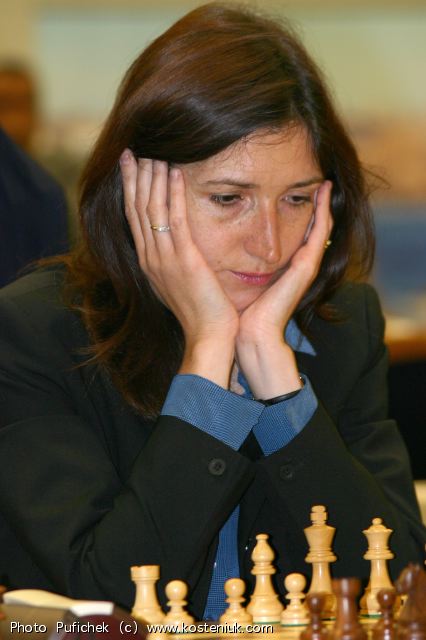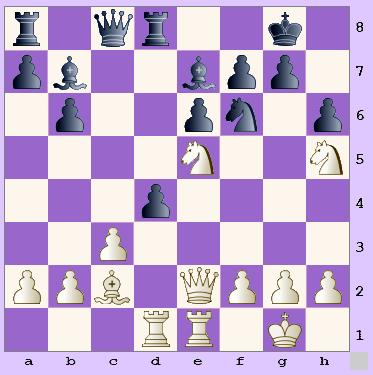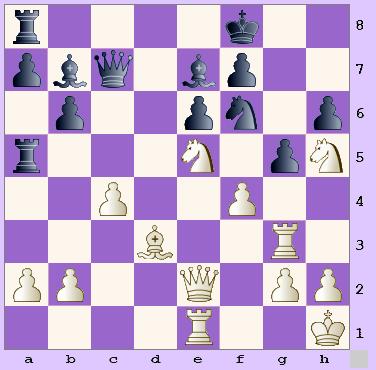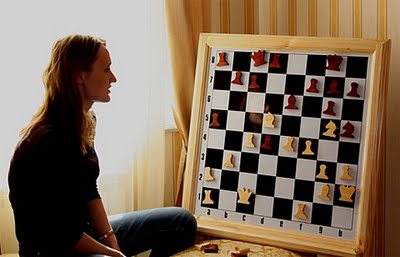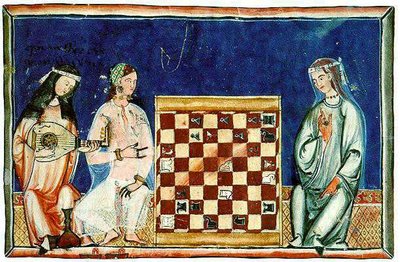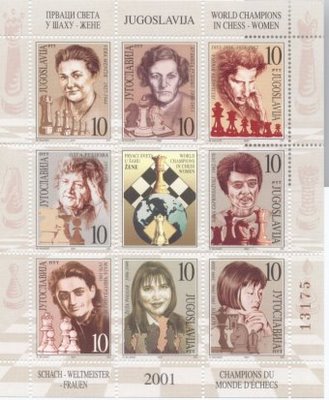Let us first try to clarify the definition of the word sport:
1. Physical activity that is governed by a set of rules or customs and often engaged in competitively.
2. An active pastime or recreation.
From this characterization, we understand that sports should meet some basic requirements. Any kind of sports consists of physical activity, skills, rules and a competitive element. Since the aspect of physical activity conveys the basic obstacle in our question, we shall leave its discussion for the end.
Does chess have a clear set of rules?
Without any doubt, chess has a precise set of rules. Acceptable regulations define a true course of the game, and some actions are under an interdiction.
Sport is a competition of skills, and chess is a competition of skills too?
To master chess skills one needs at least 10 years.
Can chess be competitive?
Chess is a battle of 2 players, so there is always an intense competition, in each chess game.
Is physical strength involved in chess competitions?
Chess demands a lot of intellectual strength, to play chess well one needs to keep focus and concentration for many hours during a chess game. It's known that intellectual work requires some energy if we will take into consideration that a chess game in average lasts 4-5 hours and an average professional chess tournament lasts for 9 days, it will become evident that chess players have to be in a very good physical shape to compete on the highest level and physical strength is required at some point to be able to keep your intellectual abilities on the same high level for a long period of time. It's also a proven fact that thinking does use up calories, and many of them. For example, during the last world championship, which for me lasted 3 weeks from be start to winning the final, I lost over 5 kilos, only playing chess, not running or doing any other kinds of physical sports. I was able to hold on well thanks to the rigorous physical training program I had gone through the 6 months previous to the championship.
Can we define chess as a sport? Yes!
Proceeding from our definition of sports, chess includes many of its components. Chess is a competition with a variety of strategy and tactics, which the skilled player will use on his way to success with much greater efficiency. Chess is not a competition of direct physical strength, but it requires a lot of intellectual strength in which physical strength should be used.
I repeat again that for non chess players, or people who have never played chess competitively, it's almost impossible to explain how physically demanding the game of chess is, and how hard and physically and psychologically challenging is to compete in top-world competitions.
On many chess blog, as well as in many different other sources the difference between women's and men's chess has been discussed many times, and it seems always to be discussed on the surface, either led by ignorance of what professional chess really is, or what sacrifices it requires, or by wish-thinking that women should be as strong as men at chess, even at the highest professional level of competition.
RATING FACTS
Here are the facts: there is only 1 woman in the top 100, and only 18 women in the top 1000:
Ratings from September 2009, ranking versus all players.
- women # 01 Judith Polgar overall # 47
- women # 02 Humpy Koneru overall # 228
- women # 03 Hou Yifan overall # 261
- women # 04 Zhao Xue overall #508
- women # 05 Tatiana Kosintseva overall # 558
- women # 06 Pia Cramling overall # 560
- women # 07 Nana Dzagnidze overall # 562
- women # 08 Anna Muzychuk overall # 578
- women # 09 Antoaneta Stefanova overall # 636
- women # 10 Marie Sebag overall # 687
- women # 11 Alexandra Kosteniuk overall # 727
- women # 12 Maia Chiburdanidze overall # 811
- women # 13 Hoang Thang Trang overall # 866
- women # 14 Natalija Pogonina overall # 869
- women # 15 Ketevan Arakhamia-Grant overall # 886
- women # 16 Nadezhda Kosintseva overall # 945
- women # 17 Danielian overall #983
- women # 18 Zhu Chen overall #995
The overall low rankings of women overall in the world of chess at first seems shocking, but there are reasons for that:
HISTORICAL
Historically chess has been considered a men's game. Men have been playing chess professionally for more than 100 years, women started to consider chess as a profession only in the late 1980's, precisely with the start of decent prizes for women's tournaments and precisely thanks to the fact titles were being awarded to women, and there was an incentive - both financial and prestigious - to try to become a strong chess player.
ROLE MODELS
It is important to note that socially having role models of one's sex is also a factor that makes chess more attractive as a profession. A boy can say "I would like to become World Chess Champion like Bobby Fischer", and that would be accepted readily. But a girl cannot say that, or at least it will not be taken seriously by her peers, parents or educators. It would be much more acceptable for a girl to say "I'd like to be an exceptional chess player like Judith Polgar". Then, when she reaches the level of Judith, who says she cannot go higher? Setting a goal of being the world's #47 (which is Judith's world ranking) is not bad, it's simply an intermediate goal towards that of being #1.
If we abolish women's titles, then to be logical you should abolish the Women's country championships, such as the recent Women's US Chess Championship, recently played in St. Louis, which was won brilliantly by Anna Zatonskih. Why should she be awarded the title of U.S. (Women's) Champion? She should probably fare somewhat worse in the men's U.S. Championship. The answer is: to be a role model and to get encouragement to go higher still!
SOCIAL
Due to these historical and social reasons fewer girls begin to play chess and even fewer continue to play chess professionally. I talked to many people from different countries around the world and all these people keep saying that girls first compete on the same level as boys, but when they reach 14-16 years old they stop playing chess competitively, they prefer to go and study for college or University or consider doing other things in life. Why? Because the chess profession for women in many countries is not considered to be a profession and many girls just cannot consider to become professional chess players/arbiters/trainers because they don't know anything about the existence of these professions or consider it not to be well paid enough (that's true!) and that's only one of the directions where my FIDE Women's commission which I co-chair is starting to work on.
We should also understand that competitive sports is not something that many women like to do since it's very nervous and physically demanding, and requires constant travel.
PHYSIOLOGICAL
Don't forget physiological reasons: men can much easier afford to focus only on one thing in life. If a boy decides to play chess professionally, or at least give it a few years to "try his luck", he can think only about chess, wake up and go to bed with only chess in his mind. On the other hand, one cannot contest that girls by their nature must have a different approach to life, probably mostly due to their biological "clock", girls must start early to think about founding a family or else it will be too late, and those are precisely the young years that you need to become strong at chess. I am sure there were many young girls with enormous talent who could have gone very far in chess but were not ready to take the "risky" path into a professional chess player's profession, and instead elected a "safer" college-work-family solution.
Of course it is possible for a girl to either manage to do everything at once, study chess, found a family, and be successful at chess competition, but that's incredibly hard to do and requires a lot of sacrifices. It's also possible to postpone founding a family until later years, but again that is quite a risky proposition.
PHYSICAL
Physical strength and therefore the ability to concentrate and thus not to make mistakes is higher in men's chess and that's also another reason why, in the long term, men are showing greater results. Many great champions have spoken about that, including the 12th World Chess Champion Anatoly Karpov.
AND... NUMBERS!
One most important factor which the WSJ lady forgets about is the purely statistical reasons. A recent study was conducted by Merim Bilalic, Kieran Smallbone, Peter McLeod, and Fernand Gobet, in Proceedings of the Royal Society B: Biological Sciences, which suggests that 96% of the statistical difference in playing abilities between the sexes can be explained by the greater number of male chess players (Link). Here is an abstract of that paper:
A popular explanation for the small number of women at the top level of intellectually demanding activities from chess to science appeals to biological differences in the intellectual abilities of men and women. An alternative explanation is that the extreme values in a large sample are likely to be greater than those in a small one. Although the performance of the 100 best German male chess players is better than that of the 100 best German women, we show that 96 per cent of the observed difference would be expected given the much greater number of men who play chess. There is little left for biological or cultural explanations to account for. In science, where there are many more male than female participants, this statistical sampling explanation, rather than differences in intellectual ability, may also be the main reason why women are under-represented at the top end.
So this shows that to get more strong women playing chess, we need to have many more women STARTING to play chess, and here we get to a point totally ignored by our WSJ journalist:
ENCOURAGEMENT
People need encouragement for their efforts, they need rewards, or else they will not try to perform at their best. In all areas of life, school, hobbies and sports, to stimulate progress, teachers and trainers have set up levels where participants can be rewarded for their intermediate success, so they get confidence and start tackling the NEXT step. Without those rewards, few would consider entering many activities. And all those rewards need to be is REALISTIC to be effective.
Every kid hobby and sports schools know this and make sure to reward their students with awards, trophies, and diplomas, at all levels, and split by boys and girls, and how different are those from handing out women's titles? They don't indicate "lower expectations", they simply reward for one step completed. Nobody has ever said that WGM is equivalent to GM, everybody knows it's not the case, WGM is just a step towards IM then GM, to make sure the player does not lose interest as it is so hard to attain the higher titles.
Any parent who reads this will understand how important it is to stimulate his or her child and always welcome the distribution of prizes and diplomas to the best in any group in which their child participates, even if it's not an Olympic level, or if it happens to include only girls.
As you have seen from the rating table above, abolishing all the women's titles, such as Woman Grand Master (WGM), and WIM (Woman International Master), and logically all the women titles below that, would just make it less interesting for women players to play, why - they can't even get recognition for success over their peers? Of course it's not total success, they still have a long way to go to become GM's and overall world champion, but the concept of abolishing titles is absurd.
WOMEN-ONLY CHAMPIONSHIPS
If we would accept the reasoning that women's titles should be abolished, we should also abolish all women-only championships, and all professional women chess players (well, maybe a handful would survive) would lose the little prize money FIDE and organizers offer them the opportunity to get.
I am very familiar with scholastics chess events, all over the world, and if girl-only categories would be eliminated, we would have even fewer girls starting to play chess, and as I believe the study mentioned above has a lot of truth it in, fewer numbers of girls starting to play chess will undoubtedly lead to fewer women that earn the highest levels in chess. There are exceptions, yes, but the fact is that more women starting to play chess will give more women chess champions.
I'm sure I can add many more reasons explaining why women for the moment are weaker than men in chess. But here is a very interesting fact:
OLYMPIC GAMES
I've been studying the question of having chess admitted into the Olympic Games, either the Summer Games or the Winter Games. According to the IOC regulations women are not allowed to compete in men's events. I confronted this question directly when I was playing in the 2008 Mind Sports Games in Beijing. That competition was affiliated with the International Committed, and played totally as per their rules. I wanted to build a mixed team, where I would be playing in the men's team, but the rules were strict and I was not allowed to do so. Point 3.2 says: In accordance with normal IOC practice, women shall compete only in Pair Events (Woman) and Women events.
So why does nobody ask this question to the IOC, why a woman cannot compete in any kind of IOC sport, like, for example, shooting? Do all sports in the Olympic family have inherent male superiority? Should we say that in the Olympic Games are accepted only sports in which men are so superior to women that they are not allowed to participate together?
Since chess wants to become a member of the olympic movement we should understand that soon we will need to deal with this issue and possibly women will not be allowed to compete in men's tournaments.
I also must point out that compared to the IOC, the FIDE is a very democratic body which let women participate in men's tournament and also allows them to get men's titles. So women who have achieved a lot in women's chess can go on and continue improving their chess level playing in men's competition. That is a tremendous advantage we women have in chess, as we know one sure way to improve it to play people a little stronger than oneself, and with time and study, the levels will keep getting close to each other.
So it turns out that women in chess have more rather than less opportunities given to them to improve, and this is what we need to get more girls and women to play chess.
WOMEN'S TITLES
The first woman who received the title of Grand Master (men) was Nona Gaprindashvili in 1978, I was the 10th woman in history to get that title in 2004, and since then already 10 more women have made the mark, that means progress is coming quite fast, considering that women have only started playing chess professionally not long ago. I also am encouraged and expected this trend to continue in the future.
Only 21 women so far have achieved the highest men's title in chess - Grandmaster (Men) while there are 1,224 men with such a title.
That however doesn't mean that we don't need women's titles. Women know very well that a WGM is less valuable than a GM, and so what? It's still a nice recognition for success achieved so far. If no WIM nor WGM titles existed at all, there would be many countries without any titled women players at all, I bet those countries would even not consider sending teams to the Olympiads, or sending their best representative to an international tournament, sponsors would be harder to come by, they would have many fewer opportunities for simuls, thank you dear Wall Street Journal reporter, you certainly want to help women's chess!
The WSJ reporter writes that FIDE "persists in the anachronistic and demeaning practice of awarding separate titles for women at lower levels of accomplishment." Nobody has ever said that WGM is the same as GM, everybody knows it's a different title and obviously it has different requirements.
On the contrary, all the encouragement is needed to:
1) Convince girls as well as boys that chess is a fun game worth trying
2) Encourage girls along the way with girls-only tournaments, prizes, trophies
3) Of course allow girls to play also in boys tournaments, which leads to faster progress since at the top levels boys may be rated higher and have more experience
4) Give titles to girls and allow them to play in any tournament they please so they can fight for any titles they can get
That's exactly what we're doing now, and time will prove we are right. The proposal of abolishing women's chess titles is absurd, sounds more like a title for a "yellow" newspaper rather than the Wall Street Journal to attract attention, and would hurt rather than help getting more girls and women to play chess.
My goal, as the current women's world chess champion, and as a chess educator, is to get every girl on the planet interested in chess. And for that I need the same thing every educator has at his fingers - the power to encourage, the power to congratulate, and the power to offer all opportunities that chess has to offer, including titles, however small they are.
I have put my whole life into chess, from the age of 5 I have loved the game, and love it up to this day. I have earned all the FIDE titles that have been available, both women's titles and men's titles, WIM, WGM, IM, GM. I am starting to give the love of chess to my tiny daughter of 2 years old, and I hope she will love it also and will play chess, as I know it teaches skills very useful in school, and later on, in life. I will do all I can to support women's chess, in a positive way, not by attacking or making provocative statements just to attract attention, but in actions.
So if you have a free moment this week-end, please teach a girl you know to play chess and show her how wonderful a game it is.
If you have any constructive and civilized comments, or simply "I agree", or "I disagree with your reasoning because of...", feel free to post below.
Posted by: Alexandra Kosteniuk
Women's World Chess Champion


